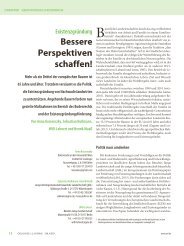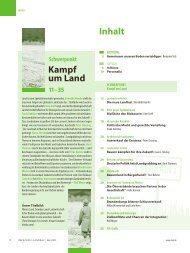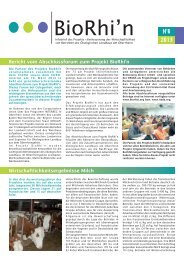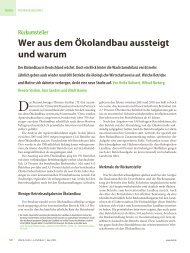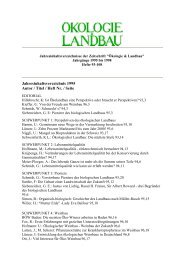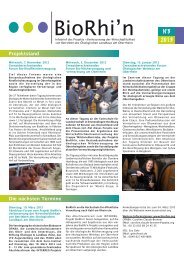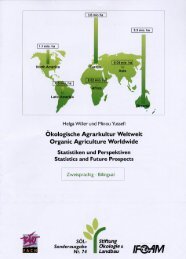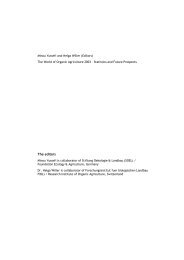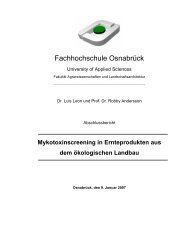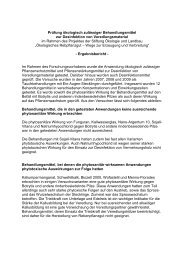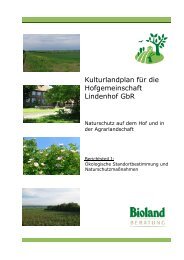the world of organic agriculture - Organic Eprints
the world of organic agriculture - Organic Eprints
the world of organic agriculture - Organic Eprints
You also want an ePaper? Increase the reach of your titles
YUMPU automatically turns print PDFs into web optimized ePapers that Google loves.
15 <strong>Organic</strong> Farming in Europe<br />
introduced <strong>the</strong>ir own brands, but none has yet developed a specialist marketing concept for <strong>the</strong>ir<br />
<strong>organic</strong> range. Since 2005, imports from outside <strong>the</strong> EU - crucial for continuity <strong>of</strong> supply through<br />
<strong>the</strong> year especially for fruit and vegetables - can carry <strong>the</strong> “AB” <strong>organic</strong> logo, reducing consumer<br />
confusion. France, like <strong>the</strong> UK, is a net importer <strong>of</strong> <strong>organic</strong> food, with a discrepancy caused by<br />
<strong>the</strong> positive development <strong>of</strong> demand combined with a more hesitant uptake <strong>of</strong> <strong>organic</strong> farming<br />
by producers 18 .<br />
There has been speculation about possible market saturation in Switzerland, but <strong>the</strong> overall trend<br />
in <strong>organic</strong> sales remains positive despite a decline in general consumer spending and <strong>the</strong> arrival <strong>of</strong><br />
food discount stores, driving down consumer prices.. The <strong>organic</strong> market grew in 2004 by about<br />
3 percent and reached a total value <strong>of</strong> €778 million 19 . Over 80 percent <strong>of</strong> produce sold is <strong>of</strong> Swiss<br />
origin. The <strong>organic</strong> sales per capita increased in 2004, and Switzerland remains <strong>the</strong> European<br />
leader with average spending <strong>of</strong> 105 EUR 20 per head. About 75 percent <strong>of</strong> sales pass through two<br />
major retailers and 15 percent through specialist <strong>organic</strong> shops, with <strong>the</strong> remainder retailing ei<strong>the</strong>r<br />
direct from <strong>the</strong> producers or through family butchers and bakery shops (Richter 2005). The two<br />
leading retail chains Co-op and MIGROS follow different strategies in <strong>the</strong>ir <strong>organic</strong> assortments.<br />
While Co-op (397 million EUR 21 retail sales in <strong>organic</strong> food in 2004) continuously broadens <strong>the</strong><br />
number <strong>of</strong> <strong>organic</strong> lines, MIGROS (193 million EUR 22 retail sales in <strong>organic</strong> food in 2004) has<br />
slightly reduced its <strong>organic</strong> commitment. With <strong>the</strong> market entrance <strong>of</strong> <strong>the</strong> German discounters<br />
ALDI Co-op and Migros increased <strong>the</strong>ir communication efforts for <strong>the</strong>ir discount segments.<br />
In <strong>the</strong> United Kingdom in 2004, retail sales <strong>of</strong> <strong>organic</strong> produce rose to an estimated 1.213 billion<br />
GBP 23 , corresponding to an annual growth rate <strong>of</strong> approximately 11 percent 24 . Retail sales made<br />
through box schemes (12 percent market share), farm shops and farmers’ markets increased by<br />
one third, and sales through independent retailers (13 percent market share) increased by over<br />
40 percent. Supermarket sales continued to grow but at a much slower rate (1.5 percent) than in<br />
previous years. However, supermarket chains in UK remain with 75 percent <strong>of</strong> <strong>the</strong> whole retail<br />
sales <strong>of</strong> <strong>organic</strong> food an important sales channel.<br />
While consumer demand for local food continues to grow, 2004 saw a one percent increase in<br />
<strong>the</strong> proportion <strong>of</strong> <strong>organic</strong> food and drink imported by supermarkets in <strong>the</strong> UK. The key factor in<br />
this was a switch away from UK-produced <strong>organic</strong> pork, beef and lettuce by some <strong>of</strong> <strong>the</strong> leading<br />
multiple retailers.<br />
In Italy, despite wider availability, <strong>the</strong> growth in <strong>the</strong> <strong>organic</strong> retail market appears to have leveled<br />
out during last years, mainly due to <strong>the</strong> general economic crisis. In a survey <strong>of</strong> Italian supermarket<br />
chains conducted by ISMEA, 56 percent reported stagnation in <strong>organic</strong> food sales, 29 percent<br />
reported growth, and 15 percent reported a decline. However, despite <strong>the</strong> economic crisis, some<br />
18 News about France http://www.bio-markt.info<br />
19 778 million EUR = 938.3 million USD (per 31.12.2005)<br />
20 105 EUR = 126.7 USD (per 31.12.2005)<br />
21 397 million EUR 479 USD (per 31.12.2005)<br />
22 193 million EUR = 232.9 USD (per 31.12.2005)<br />
23 1.213 billion GBP = 2.14 USD = 1.774 EUR (per 31.12.2005)<br />
24 Soil Association <strong>Organic</strong> Market Report 2005<br />
139



